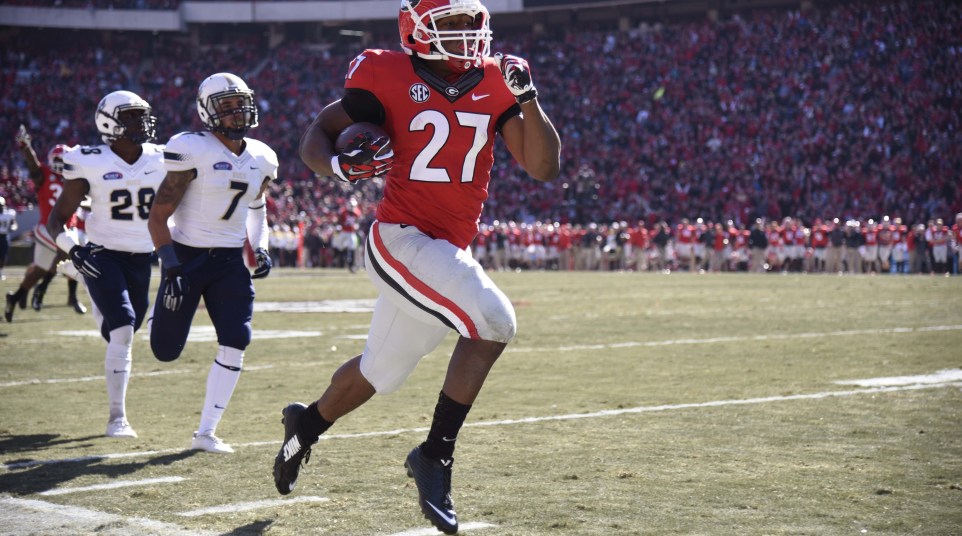Nick Chubb's early maturity as a runner will be asset to UGA in '15
Players like LSU’s Leonard Fournette and Alabama’s Derrick Henry spent all spring ingesting copious amounts of the practice repetitions for their respective teams, reportedly making huge improvements.
Nick Chubb mostly stayed out of harm’s way, carrying three times for 34 yards in the team’s G-Day game.
We’ve maintained in intense inter-office debate for most of the offseason about who will be better in 2015, Chubb or Fournette. Bias aside, a central tenant of that debate is projecting how each player will change during his true sophomore season.
Both of them have a blend of size, speed, power and agility unlike what we’ve seen in years, even in the always-saturated talent pool known as the SEC.
Chubb took over for the suspended Todd Gurley during the middle of last season and immediately seemed to grasp when to use each of his physical abilities, mixing and matching seamless cuts, stiff-arms, speed and bullying power as the situation called for it, much like LeBron James in the NBA.
Fournette lacked patience, seemingly hitting the first patch of open grass he saw, lowering his head and attempting to blast through anything in front of him — sometimes even his own offensive linemen.
It’s close, but the LSU standout probably edges Chubb in a track meet type of athletic comparison. But in ’14, Chubb was far better at harnessing that talent into production on the football field.
Whereas Fournette, and even Henry, spent this spring still fine-tuning the basics of vision, cutting, setting up blockers and essentially slowing down the game, Chubb, in just his second college year, already is working on 300 and 400-level running back courses.
Such rare early progression allowed Chubb and the Georgia coaches to focus on working him in the passing game as a route-runner, receiver and blocker. Those are areas that many of the top running backs even in this year’s loaded NFL draft class are just beginning to grasp. Chubb has two more full years before he’s even eligible to enter the draft.
Those are nuances that often don’t register with the average college football fan watching star SEC running backs do their thing on Saturdays. Certainly carrying the football with success is the primary objective for a college running back, and as such, don’t be surprised if Fournette and Henry gain — or, gasp — even surpass Chubb’s production as a runner in ’15.
But Chubb has a good chance to be a more versatile player in ’15 and beyond because already he’s able to focus on being an all-around, three-down back just as effective in passing situations as he is on second-and-2.
We saw a little bit of that progression in Georgia’s spring game, as Chubb caught as many passes — three — as he had carries. He spent most of the spring resting his legs, which UGA rode hard in ’14. Because he’s already so advanced, the team treated him almost like a star NFL veteran in training camp, protecting him at all costs.
Considering he’s the alpha dog — excuse me, Dawg — of Georgia’s offense in ’15 and beyond, that’s a great thing for UGA football.

